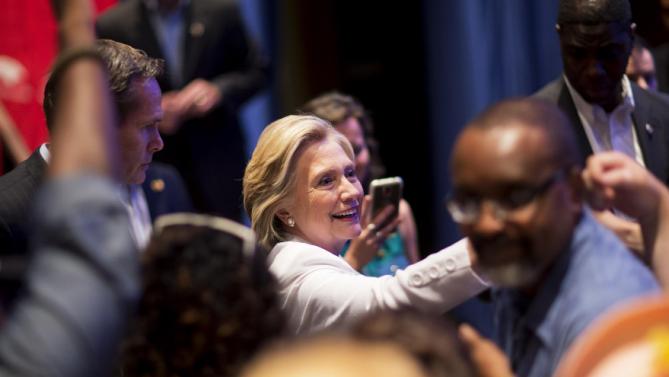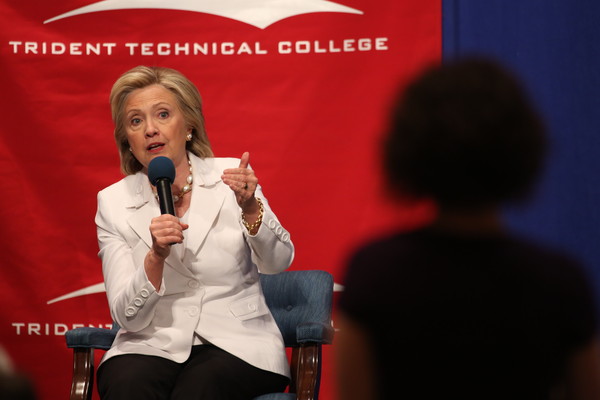Hillary made a campaign stop in Santee, SC today and spoke at Trident Technical College in Charleston.


- Democratic
presidential candidate Hillary Rodham Clinton listens to a speaker
during a campaign stop, Wednesday, June 17, 2015, in Santee, S.C. (AP
Photo/David Goldman)

- Democratic
presidential candidate Hillary Rodham Clinton gestures while addressing
an audience during a campaign stop at Trident Technical College
Wednesday, June 17, 2015, in North Charleston, S.C. (AP Photo/David
Goldman)

- Democratic
presidential candidate Hillary Rodham Clinton addresses an audience
during a campaign stop at Trident Technical College Wednesday, June 17,
2015, in North Charleston, S.C. (AP Photo/David Goldman)

- Phoebe
Jordan, 8, center right, clutches a stuffed donkey while listening to
Democratic presidential candidate Hillary Rodham Clinton address an
audience during a campaign stop at Trident Technical College Wednesday,
June 17, 2015, in North Charleston, S.C. Sitting at left is Jordan's
teacher Kim Davidson with her daughter Caroline at right. (AP
Photo/David Goldman)

- Democratic
presidential candidate Hillary Rodham Clinton steps onstage to address
an audience at Trident Technical College during a campaign stop
Wednesday, June 17, 2015, in North Charleston, S.C. (AP Photo/David
Goldman)

- Democratic
presidential candidate Hillary Rodham Clinton greets supporters after
addressing an audience during a campaign stop at Trident Technical
College Wednesday, June 17, 2015, in North Charleston, S.C. (AP
Photo/David Goldman)






















In
South Carolina, Hillary Clinton held a forum at Trident Technical
College in North Charleston to discuss the need for youth job training
and apprenticeships to help Americans get ahead and stay ahead.
- As of May 2015,
the unemployment rate for 18- to 34-year olds was 7.8 percent –
outpacing the overall unemployment rate of 5.5 percent. The unemployment
rate among African-American young adults was even higher, at 14.6
percent.
As a part of her vision for building an economy for
tomorrow, Clinton explained her belief that every American – especially
young Americans – should be able to learn new skills in order to seize a
new work opportunity or attain a promotion at their current place of
employment.
Clinton outlined high-level principles for a workforce and skills agenda that leads to good jobs and good wages, including:
- For
workers and job-seekers: Providing more robust, coherent, and
accessible training programs and resources that are up to date for 21st
Century technology and that lead to good jobs and lifelong skills and
credentials.
- For training providers: Giving training providers,
including community colleges, the support they need to scale up and
respond to the needs of the local workforce and employers – while
insisting on accountability, transparency and high quality.
- For
government: Making government at every level a more effective partner in
bringing together workers, labor, employers and training providers to
prepare workers for good jobs.
- For employers: Encouraging
employers to invest in their workers for the long term through training,
apprenticeships and creating good jobs.
As part of this agenda, Clinton called for a tax credit for businesses for every apprentice they hire.
- The
proposal would put forward a tax credit for businesses of $1,500 per
apprentice and would insist on accountability for employment and
earnings outcomes for programs receiving the credit. Clinton also said
that businesses should receive a bonus on that tax credit for providing
opportunities specifically for young people.
- This proposal
builds on bipartisan efforts such as those by Senators Cory Booker
(D-NJ) and Tim Scott (R-SC), as well as Senators Maria Cantwell (D-WA)
and Susan Collins (R-ME). In order to be eligible for the credit,
apprentices would need to be registered, and qualifying apprenticeship
programs would have to meet rigorous federal and/or state standards and
outcome measures.
Continuing the themes of her launch
speech, Clinton explained that we should do more to encourage businesses
to build up the skills of their workers and create good jobs, instead
of seeking a quick profit at the expense of these kinds of long-term
investments.
She described how apprenticeships are widely cited as
a win-win for workers who will see higher wages and businesses who will
be able to gain skilled employees.
Experts are praising Clinton’s workforce agenda and plan to provide tax credits to businesses that hire apprentices:
- Byron Auguste,
Managing Director of Opportunity@Work, a civic enterprise based at New
America, and former Deputy Director of the National Economic Council and
Senior Partner at McKinsey & Company: “What Hillary Clinton is
proposing to invest in our workforce is right on track. Changing our
workforce policies in ways that encourage employers to put real 'skin in
the game' by investing in apprenticeships, on-the-job training, and
partnerships with community colleges can make a big difference.
Employers spend 20 times as much on training as the federal government
does, so smart policies to give them incentives to train people on the
retail floor, call center, and factory warehouses to move into better
paying jobs make tax dollars spent on training go much further. We need
to give more working Americans clear paths into better-paying, skilled
middle class jobs that our businesses need to compete and expand."
- Harry Holzer, Professor at Georgetown’s McCourt School of Public Policy and former Chief Economist for the U.S. Department of Labor:
“In order to encourage growth of the middle class, and more security
and higher earnings for those in the middle class, we need new policies
that help students and workers get the postsecondary credentials that
the labor market values, plus important workforce services. In addition,
we need to help and encourage employers to provide more well-paying
jobs to workers with those credentials. The principles announced by
Hillary Clinton today are the right ones to help us achieve those
objectives."
Hillary Clinton’s belief in investing in
young workers is rooted in her own personal experience and the story and
example of her mother Dorothy Rodham.
- After law school,
Clinton went to work for South Carolina’s own Marian Wright Edelman at
the Children’s Defense Fund. Clinton has said that, while she has had
many jobs since then, it was this first job that set her course for a
lifetime of fighting for America’s children and families.
- It was
through the assistance of a grant for law students working on civil
rights research that Clinton was able to work for Marian Wright Edelman,
who later sent her to South Carolina for the first time to study the
plight of kids imprisoned in adult jails.
- Clinton’s mother,
Dorothy Rodham, was abandoned by her parents and, by age 14, was on her
own working as a housemaid. Later in life, Rodham explained to Clinton
that the woman whose house she cleaned had encouraged her to attend high
school – one of the first times she felt inspired to greater purpose in
life and emphasizing the importance of a good first job.
Throughout
her career, Hillary Clinton has fought to strengthen workforce
development and expand opportunities for skills and job training because
she knows the value of investing in workers and providing them with a
hand up.
- In 2014, as a part of her work at the Clinton
Foundation, she announced Job One, a program focused on creating new
economic opportunities for young people in the United States. Job One
aims to address job training, hiring and mentoring. It works with
employers big and small, as well as unions like the Building Trades.
Participants commit to expand opportunities for youth that have been hit
hard by the recession and its fallout.
- In 2003, as Senator, she
sponsored the Access to Employment and English Acquisition Act, which
would have expanded job training opportunities for people who are
Limited English Proficient (LEP). [S. 1543, 7/31/03]
- Hillary
championed Regional Skills Alliances that group together businesses,
educational institutions, labor organizations, and state and local
governments to develop cutting edge job training methods. [Washington
Post, 2/2/00; S.431, 3/1/01; S.2586, 6/24/04; S.1034, 3/29/07]
This
is a sharp contrast with Republicans who have passed legislation that
could result in further consolidation and cuts in training programs.
- The
budget passed by Republicans in the House and Senate have put education
and job training programs at risk by imposing deep spending cuts that
could threaten occupational training and adult education programs.































